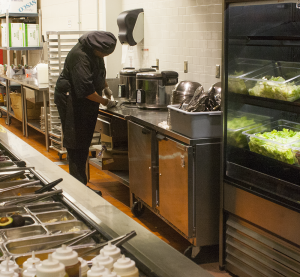
Workers at on-campus Aramark locations, such as O’Donovan Hall, have negotiated a contract with the company in a months-long process.
Aramark workers on Georgetown’s campus negotiated a mutually satisfactory contract with Aramark management last Tuesday, implementing a fair process for worker unionization and improved work and wage conditions in O’Donovan Hall, Hoya Court and the Georgetown University Hotel and Conference Center.
The deal, ratified 94-0 by workers during a meeting on Thursday night, includes a plan for unionization, a 40-hour paid workweek, an agreements process to report managerial abuse, a cheaper healthcare insurance plan and the creation of a food sustainability committee.
In the past months, workers and members of the Georgetown Solidarity Committee have protested against Aramark on allegations of managerial interference in the unionization process and poor work conditions. Workers at the hotel claimed that they were surveyed by managers while they spoke with members of the GSC about the prospect of joining UNITE HERE, the same union that workers at Leo’s, Cosi and Starbucks joined in March 2011.
In January, the GSC created a petition in support of the workers’ demands, which amassed 2,021 signatures from students and other community members.
According to Josh Armstead, a worker at Leo’s who was part of the negotiations committee, Aramark was unwilling to comply with the workers’ demands during the initial stages of the negotiations.
“When we first went into the negotiations, [Aramark] said, ‘Why are you here? We don’t see the need to have a raise or any other benefits,’” Armstead said. “It’s not at the standard of other Aramark universities in D.C. like Catholic, American. Why are we being treated as second-class employees when we work for the same company in the same city, and go through the same circumstances as our brothers and sisters? Their refusal [to listen] was what drove the workers to this victory.”
According to UNITE HERE Local 23 Union Representative Sam Geaney-Moore (SFS ’12), who represents Aramark employees at Georgetown, workers will be able to unionize under the renegotiated contract. Geaney-Moore was a member of the GSC while attending Georgetown as a student and helped fight for workers in Leo’s, Starbucks, Cosi and Wolfington Hall, which unionized in 2011.
“The parties have agreed to a fair process through which all unrepresented employees of Aramark of the Georgetown campus will be able to decide whether or not to join a union prior to the 2015 academic year,” Geaney-Moore said.
Francisco Lopez, a worker at Elevation Burger in Hoya Court, said that unionization provides more opportunities for upward mobility.
“You don’t have to be worried about a new person coming in and taking your spot or a spot that you’ve always wanted, because you have the seniority in placement too, so they have to respect that. They can’t bring somebody else from the street and say ‘Here’s your new boss’ while he doesn’t know anything,” Lopez said.
The renegotiated contract will also enforce a 40-hour workweek so that workers will have the opportunity to work for more paid hours. Currently, the average workweek is 37.5 hours.
In addition, the contract includes a minimum wage increase of 50 cents per hour, with an additional 25-cent increase for workers who fall behind the pay scale. These wage conditions are in conjunction with those of Aramark workers at Catholic University and American University.
Workers will also be covered by a new healthcare insurance plan with increased coverage and no deductibles.
Armstead, a worker at Leo’s who was part of the contract negotiations committee, said that the new insurance plan will reduce the costs of paying for separate coverage.
“You’re no longer paying for separate coverage that will eat your paychecks. Most workers will see definite savings, [in both] single [and] family [plans],” Armstead said. “A lot of our workers have family members — sons, daughters, mothers, fathers — that they’re taking care of. This will help them in terms of health care.”
Lastly, the contract includes the creation of a new food sustainability committee, where workers will be able to provide input on food safety and sustainability practices on campus. Workers will undergo 16 hours of training regarding these practices.
Armstead said that the idea for the committee originated from the workers’ desire to become more involved in discussions regarding the quality of food served on campus.
“Essentially, [we want to] put better food. We actually hear students. I eat the same thing as the students. Most of the time it’s pretty good, but it gets repetitive when you’re at late night and it’s chicken fingers again,” Armstead said.
Overall, Aramark workers at Georgetown have expressed support for the new contract.
Armstead said that he was optimistic about the benefits included in the renegotiated contract, particularly in reference to the wage conditions.
“I believe I should start experiencing this American dream that people keep talking about, ‘cause so far I haven’t seen it,” Armstead said. “I believe that now, I can afford just to be able to live and not feel like I’ll go broke every month. I believe that many workers feel the same. This will help lift them and their families up.
Armstead said that the deal represents a victory for the workers after months of negotiating with Aramark for better treatment in the workplace.
“I can get a general sense that it is a victory that most workers can definitely feel good about. I saw people whose faces showed gloom and doom light up. Most people, who doubted that it wouldn’t happen, finally saw that there’s power in labor. They should feel powerful, not powerless,” Armstead said.














